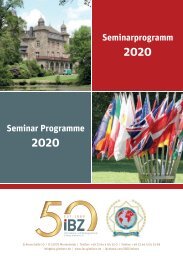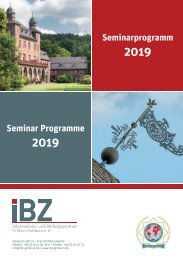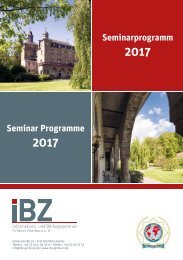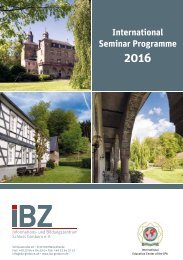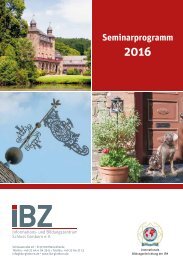50 Years IBZ Gimborn
You also want an ePaper? Increase the reach of your titles
YUMPU automatically turns print PDFs into web optimized ePapers that Google loves.
1980s<br />
The Offices are now in the Castle’s Annex<br />
Internationalisation is real<br />
The plan to become more international; that is, to attract to seminars<br />
interested persons from other countries – one of the goals that had already<br />
been a force behind the founding of the Association – could not be<br />
realised with the approach adopted so far, of German-language seminars.<br />
Admittedly, events did attract attendance from immediate neighbour<br />
countries, specifically from Austria and the Netherlands, but also from<br />
Switzerland, Denmark, and Luxembourg. To widen the circle of countries<br />
permanently, however, it proved necessary to admit other languages<br />
too. Some encouraging experience had already been gained from early<br />
seminars that had been carried out in English, without interpretation, with<br />
international participation – albeit largely without British participants<br />
initially. The growing ranks of the Association and the efforts to acquire<br />
Members from outside Germany too made it appear advisable to provide<br />
the <strong>IBZ</strong> with a visibly international profile in educational work.<br />
Before this plan could be implemented to any great extent, in 1984 an<br />
obstructive new rule appeared in connection with public funding, which<br />
had already been reduced besides: the incorporation of the Landeskinderklausel<br />
(state citizenship clause) into the North Rhine-Westphalian<br />
Weiterbildungsgesetz. With the aim of channelling the expenditure of<br />
North Rhine-Westphalian tax money first and foremost to benefit persons<br />
who lived or worked in North Rhine-Westphalia, the amount of funding<br />
for participants from outside North Rhine-Westphalia became especially<br />
regulated and substantially restricted. This regulation affected and still<br />
affects the <strong>IBZ</strong> very painfully, since the implementation of international<br />
events without basic financing under the Weiterbildungsgesetz was not<br />
economically viable in most cases. Nonetheless, the projected approach<br />
to internationalise the seminars could be undertaken and subsequently<br />
maintained also.







